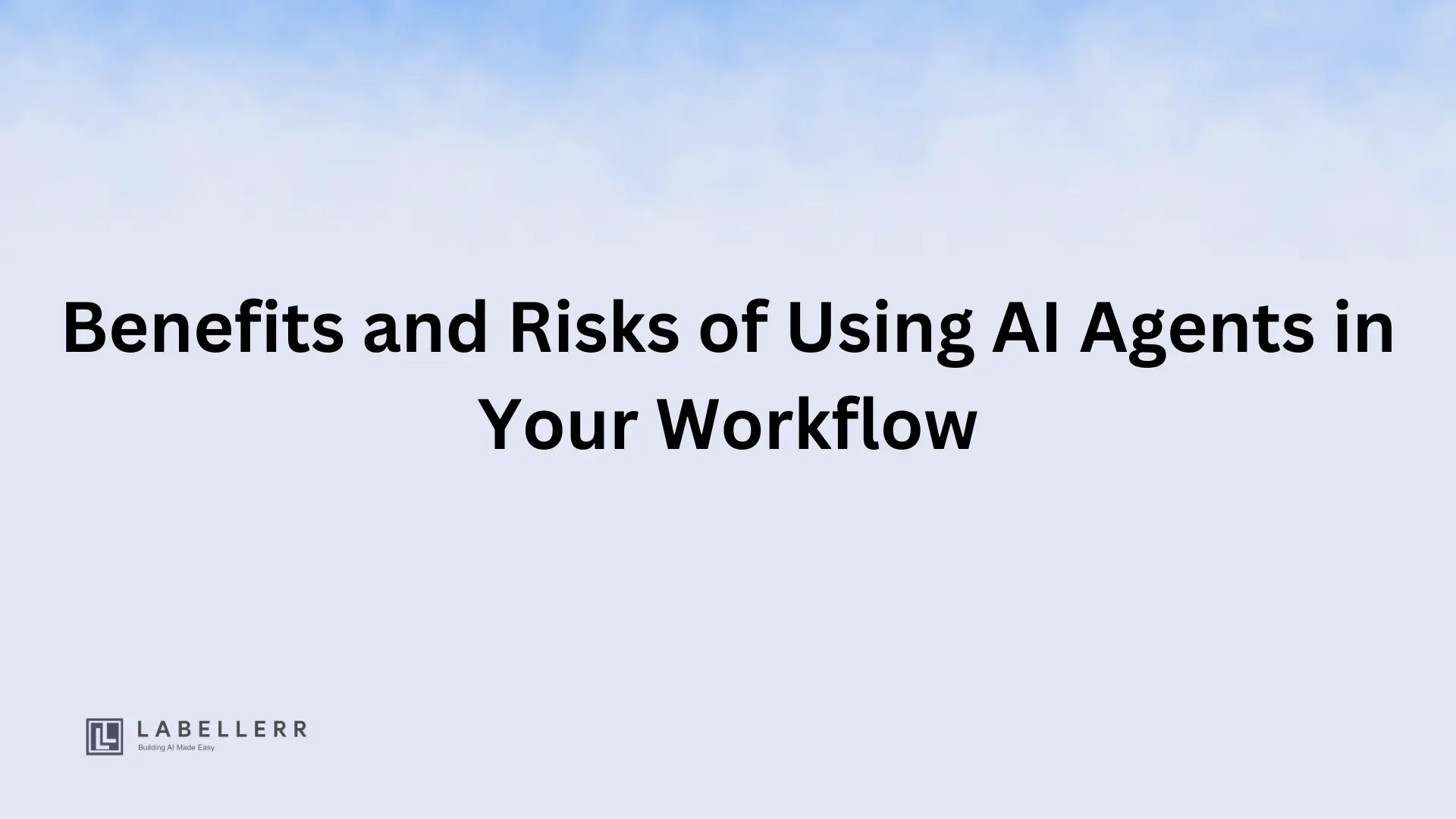AI Agents in Your Workflow: Key Benefits and Potential Risks
AI agents boost efficiency, automate tasks, and enhance decision-making, but they also pose risks like data security, bias, and transparency issues. Businesses can mitigate these challenges with ethical AI practices, human oversight, and robust security measures to ensure reliable AI integration.

Agents are changing the way businesses operate by automating processes, improving efficiency, and enhancing decision-making.
These intelligent systems can analyze large amounts of data, learn from past interactions, and execute tasks without human intervention. While AI agents offer many advantages, they also come with risks that businesses must consider.
Understanding both the benefits and challenges of agents can help organizations use them effectively while minimizing potential downsides.
Benefits of Using Agents
Improved Efficiency and Productivity
Agents can handle repetitive and time-consuming tasks, allowing employees to focus on more strategic activities.
They work continuously without breaks, making them more efficient than human workers in certain areas. Businesses that integrate agents into their workflows can reduce operational bottlenecks and complete tasks faster.
For example, AI-powered chatbots handle customer service inquiries instantly, reducing wait times and improving customer satisfaction.
In data processing, agents can sort, classify, and analyze massive datasets in seconds, eliminating the need for manual input.
Cost Savings and Resource Optimization
Agents help businesses reduce costs by automating processes that would otherwise require large teams.
Companies can save on labor costs, reduce errors, and optimize resources. AI-driven automation also reduces expenses related to repetitive tasks, such as data entry, inventory management, and IT support.
For example, financial institutions use AI-driven fraud detection systems to monitor transactions in real-time, reducing the need for manual review teams.
Similarly, AI-powered HR platforms automate resume screening, interview scheduling, and onboarding, cutting recruitment costs.
24/7 Availability and Faster Response Times
Unlike human employees, agents operate 24/7 without fatigue. This ensures that businesses can provide uninterrupted services, improving customer experience and operational efficiency.
For example, AI-powered virtual assistants handle customer support queries at any time of the day, reducing response times and improving user engagement.
Automated workflow systems ensure that critical business processes continue running smoothly even outside regular working hours.
Data-Driven Decision Making
Agents analyze vast amounts of data and provide insights that help businesses make better decisions.
By identifying trends, predicting outcomes, and offering recommendations, agents help companies optimize their strategies.
For example, AI-driven marketing platforms analyze customer behavior to create personalized advertising campaigns.
Agents in supply chain management predict demand fluctuations, allowing businesses to optimize inventory levels and reduce waste.
Scalability and Adaptability
Agents can scale effortlessly to handle increasing workloads. Businesses can deploy AI solutions to manage large amounts of data, respond to customer queries, or automate processes without needing additional human resources.
For example, e-commerce platforms use agents to handle seasonal surges in customer orders by automating order processing, payment verification, and logistics management.
In cybersecurity, AI-powered monitoring systems scale automatically to detect and respond to cyber threats in real time.
Improved Accuracy and Error Reduction
Agents minimize human errors by following predefined rules and learning from past mistakes.
They provide consistent and accurate results, reducing the likelihood of costly mistakes in business operations.
For example, AI-driven quality control systems in manufacturing detect product defects before items reach customers.
In finance, AI-powered compliance tools monitor transactions to ensure regulatory adherence, reducing the risk of legal violations.
Risks of Using Agents
Data Privacy and Security Concerns
Agents rely on large amounts of data to function effectively. However, handling sensitive data comes with security risks, including breaches, unauthorized access, and data misuse.
For example, AI-powered HR systems that manage employee records must ensure that personal data remains protected.
AI-driven healthcare platforms processing patient data must comply with strict privacy regulations like HIPAA and GDPR. If these systems are compromised, it could lead to severe legal and reputational consequences.
Bias and Ethical Issues
Agents can develop biases based on the data they are trained on. If AI models are trained on biased datasets, they may produce unfair or discriminatory outcomes, leading to ethical concerns.
For example, AI-powered hiring platforms may favor certain demographic groups if their training data contains biases from past hiring practices.
Similarly, AI-driven loan approval systems may deny applications unfairly if the algorithm is not properly designed to account for socioeconomic factors.
Addressing bias in AI requires careful dataset selection, continuous monitoring, and human oversight.
Integration Challenges
Implementing Agents into existing workflows can be complex. Many businesses rely on legacy systems that may not be compatible with AI technologies.
Integrating AI requires investment in infrastructure, software upgrades, and employee training.
For example, an organization adopting AI-powered workflow automation may face challenges in connecting AI tools with outdated ERP or CRM systems.
This can result in delays, additional costs, and resistance from employees unfamiliar with AI-driven processes.
Job Displacement and Workforce Disruption
AI automation can replace certain human jobs, leading to concerns about job displacement.
While agents improve efficiency, they also reduce the need for certain manual roles, particularly in industries like manufacturing, customer service, and data entry.
For example, AI-powered chatbots reduce the need for human customer support agents, and automated assembly lines replace manual labor in factories.
To mitigate job losses, businesses should invest in workforce retraining and reskilling programs, helping employees transition to roles that require human creativity and critical thinking.
Dependence on AI and Lack of Human Judgment
Agents follow predefined rules and algorithms, but they lack human intuition and judgment.
In situations that require creativity, empathy, or ethical decision-making, agents may struggle to provide the right solutions.
For example, AI-powered legal analysis tools can summarize case laws, but they cannot replace human lawyers who understand legal nuances and client needs.
AI-driven medical diagnostic tools provide accurate recommendations, but they cannot replace doctors who consider a patient's emotions, history, and broader health conditions when making final decisions.
Regulatory and Compliance Risks
AI technologies are advancing faster than regulations, leading to uncertainties regarding compliance with legal and ethical standards.
Governments and regulatory bodies are still developing frameworks to govern AI usage, making it challenging for businesses to ensure compliance.
For example, AI-powered financial trading bots operate at high speeds, potentially causing market instability if not regulated properly.
AI-driven data collection and analysis tools must comply with evolving data protection laws, which vary across regions and industries.
Balancing Benefits and Risks
To maximize the advantages of agents while minimizing risks, businesses should adopt a balanced approach.
- Ensure transparency and accountability by using explainable AI (XAI) models that provide clear reasoning for their decisions.
- Maintain human oversight in critical AI applications to prevent unintended consequences and ensure ethical compliance.
- Invest in cybersecurity measures to protect sensitive data from breaches and unauthorized access.
- Continuously monitor and update AI models to reduce biases and improve fairness.
- Develop workforce reskilling programs to help employees transition to new roles alongside AI-driven automation.
Conclusion
Agents offer powerful benefits, including increased efficiency, cost savings, and enhanced decision-making.
However, businesses must also be aware of the risks, such as data security challenges, ethical concerns, and workforce disruption.
By implementing AI responsibly, integrating human oversight, and ensuring compliance with regulations, organizations can successfully leverage agents to improve workflows while minimizing potential downsides.
As AI technology continues to evolve, businesses that strategically adopt agents will stay ahead in an increasingly automated world.
FAQs
What are the key benefits of using agents in workflows?
Agents improve efficiency, automate repetitive tasks, enhance decision-making, and reduce operational costs across various industries.
What are the risks of integrating agents into workflows?
Risks include data security concerns, potential biases, lack of transparency, high implementation costs, and dependency on AI systems.
How can businesses mitigate the risks of agents?
Companies can mitigate risks by ensuring data privacy, using ethical AI guidelines, conducting regular audits, and combining AI with human oversight.

Simplify Your Data Annotation Workflow With Proven Strategies
.png)


